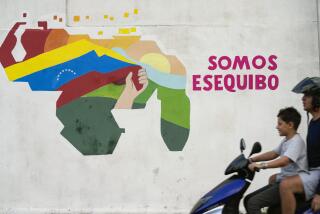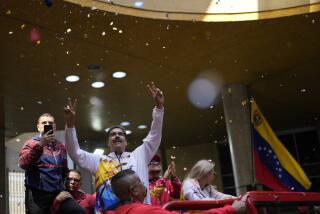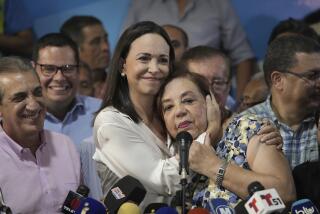Challenging Venezuela’s Chavez
For more than a decade, political opponents of Venezuelan President Hugo Chavez have sought to unseat the fiery populist. Yet his rivals have proved to be their own worst enemy. They’ve bickered among themselves, waged electoral boycotts that played into Chavez’s hands, and failed to show that they understand the plight of the country’s poor.
But this past weekend, the opposition did the unthinkable: It coalesced behind a single candidate, Henrique Capriles, a youthful governor from the state of Miranda, to challenge Chavez in this year’s presidential elections. It’s a welcome development in a country in desperate need of new voices and policies.
Despite its vast oil reserves,Venezuela’s troubles are mounting. The country is politically and economically divided. Unemployment is rampant and inflation has hovered near 30%. The country’s homicide rate is among the highest in the hemisphere, with near-daily reports of killings and kidnappings. And even the president’s most ardent supporters now concede that his “Bolivarian” socialist revolution is losing its appeal as voters tire of his constant campaigning and vitriolic attacks against opponents.
Capriles represents a new style of political opponent in a country where old parties are largely viewed as corrupt. He defeated the president’s handpicked candidate in his run for governor by emphasizing education and pledging to represent rich and poor alike. He’s vowed to maintain programs for the poor put in place by Chavez and to pursue socially responsible capitalism. He’s launched anti-hunger projects, and called for the private and public sectors to work together to raise living standards for everyone.
Of course, it’s too early to predict what will happen in the months leading up to the Oct. 7 election. Chavez, who has been battling an undisclosed cancer, has slowed in recent months, and concerns about his health remain. Still, he promises to give his opponent “the beating of the century.” He enjoys support among the poor thanks to programs that have helped slash extreme poverty by half. And he’s successfully silenced critics by shuttering media outlets and accusing them of inciting violence — an allusion to the 2002 coup that briefly ousted him.
The race is, of course, as much a referendum on the current president’s tenure as it is a test of the new opposition leader. But at least it appears that Venezuelans will have a real choice at the ballot box.
More to Read
A cure for the common opinion
Get thought-provoking perspectives with our weekly newsletter.
You may occasionally receive promotional content from the Los Angeles Times.






